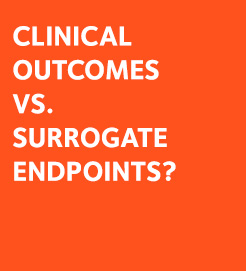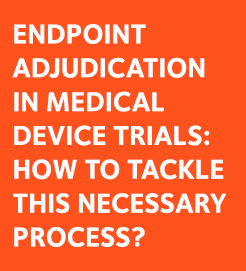Clinical trials are designed based on scientific principles and executed by highly trained teams including principal investigators (PI) with experience both in the pathology under investigation and in clinical development. Study endpoints are carefully selected and, in most cases, agreed with regulators before study start. Why, then, would there be a need to adjudicate study endpoints by independent expert committees? Here are five clinical trial situations when an external adjudication of study endpoints is recommended.
Study endpoints are defined very early in the planning of a clinical trial. In most cases, study endpoints are common with other studies in the same pathology and even shared with other sponsors investigating different drugs. Some of these study endpoints are direct and others are surrogate but all have previously been agreed with the regulatory agencies that will review the results of the study and eventually grant (or refuse) a marketing authorization.
Cardiac events in a trial investigating a drug for coronary artery infarction are a typical study endpoint example. Many symptoms may lead to suspect a cardiac infarction and it is very difficult, even for a specialist, to be certain whether a patient experienced this or some other cardiac clinical event. The safest way to stay impartial and provide solid results is to submit each suspected case to a group of specialists who are independent of the trial and unbiased from knowledge of either the drug or the patient.
Not all clinical studies, however, benefit from the endpoint adjudication procedure and the additional cost and burden must be carefully weighted against the advantages. Here are five example situations when submitting the data to a blinded independent panel of experts provides the best chance of a correct assessment and strong study results.
Situation 1: The study endpoints are complex
When study endpoints are complex or symptoms are not sufficiently specific, study results cannot rely solely on the judgement of a single individual (here the PI). In a regular medical practice situation, the patient would be treated preemptively to avoid any worsening, but in a clinical trial situation, it is important to understand whether a certain definition was met. Many diseases cause similar symptoms and there is not always a biomarker allowing to decide beyond doubt.
Situation 2: Study endpoint adjudication is a request from health authorities
During pre-development discussions, health authorities may request adjudication of study endpoints. In such a case, it is advisable to put in place the adjudication process as soon as possible and share details with the health authorities to make sure that their request and concerns are adequately addressed.
Situation 3: The study interventions are difficult to mask from a caring physician
In a clinical trial investigating a medical device, for example, it is very difficult, if not impossible, to hide the use from the principal investigator and other site staff. In this and other circumstances where study interventions are difficult to hide, bias could be introduced in the PI’s judgement.
Situation 4: Medical image assessment is involved
Because the interpretation of images is subjective, there is a risk that the PI, who has been following the patient and has knowledge of several other parameters, introduces a bias.
Situation 5: There is an opportunity to reinforce trust in the study results
In the critical COVID-19 situation, for example, in spite of all the rigor used in planning and executing clinical trials, the good faith of investigators and sponsor staff, and the transparency of clinical research procedures, there was an additional opportunity to reinforce the trust of health authorities but also of the public beyond any doubt.
Any combination of the above situations is possible and reinforces the need for seeking independent experts’ opinion for study endpoint assessment in clinical trials.
DOWNLOAD NOW THE FREE ENDPOINT ADJUDICATION HANDBOOK
The Complete Manual / Reference Book (34 pages) with all the topics related to the Independent Endpoint Adjudication Committees Management








